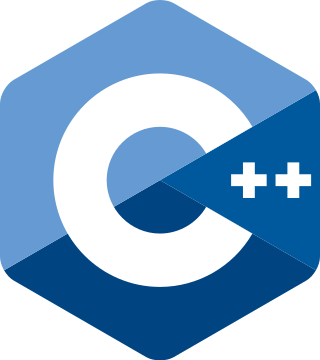Related Research Articles
In computer programming, operator overloading, sometimes termed operator ad hoc polymorphism, is a specific case of polymorphism, where different operators have different implementations depending on their arguments. Operator overloading is generally defined by a programming language, a programmer, or both.
Polymorphism, polymorphic, polymorph, polymorphous, or polymorphy may refer to:

Smalltalk is a purely object oriented programming language (OOP) that was originally created in the 1970s for educational use, specifically for constructionist learning, but later found use in business. It was created at Xerox PARC by Learning Research Group (LRG) scientists, including Alan Kay, Dan Ingalls, Adele Goldberg, Ted Kaehler, Diana Merry, and Scott Wallace.

C++ is a high-level, general-purpose programming language created by Danish computer scientist Bjarne Stroustrup. First released in 1985 as an extension of the C programming language, it has since expanded significantly over time; as of 1997, C++ has object-oriented, generic, and functional features, in addition to facilities for low-level memory manipulation for systems like microcomputers or to make operating systems like Linux or Windows. It is usually implemented as a compiled language, and many vendors provide C++ compilers, including the Free Software Foundation, LLVM, Microsoft, Intel, Embarcadero, Oracle, and IBM.
In computer programming, a generic function is a function defined for polymorphism.
A method in object-oriented programming (OOP) is a procedure associated with an object, and generally also a message. An object consists of state data and behavior; these compose an interface, which specifies how the object may be used. A method is a behavior of an object parametrized by a user.
In programming language theory and type theory, polymorphism is the use of a single symbol to represent multiple different types.
In some programming languages, function overloading or method overloading is the ability to create multiple functions of the same name with different implementations. Calls to an overloaded function will run a specific implementation of that function appropriate to the context of the call, allowing one function call to perform different tasks depending on context.
The Glasgow Haskell Compiler (GHC) is a native or machine code compiler for the functional programming language Haskell. It provides a cross-platform software environment for writing and testing Haskell code and supports many extensions, libraries, and optimisations that streamline the process of generating and executing code. GHC is the most commonly used Haskell compiler. It is free and open-source software released under a BSD license. The lead developers are Simon Peyton Jones and Simon Marlow.
In a given programming language design, a first-class citizen is an entity which supports all the operations generally available to other entities. These operations typically include being passed as an argument, returned from a function, and assigned to a variable.
In computer science, dynamic dispatch is the process of selecting which implementation of a polymorphic operation to call at run time. It is commonly employed in, and considered a prime characteristic of, object-oriented programming (OOP) languages and systems.
In computer programming, operators are constructs defined within programming languages which behave generally like functions, but which differ syntactically or semantically.
In software engineering, double dispatch is a special form of multiple dispatch, and a mechanism that dispatches a function call to different concrete functions depending on the runtime types of two objects involved in the call. In most object-oriented systems, the concrete function that is called from a function call in the code depends on the dynamic type of a single object and therefore they are known as single dispatch calls, or simply virtual function calls.
In programming languages and type theory, parametric polymorphism allows a single piece of code to be given a "generic" type, using variables in place of actual types, and then instantiated with particular types as needed. Parametrically polymorphic functions and data types are sometimes called generic functions and generic datatypes, respectively, and they form the basis of generic programming.
In computer science, a type class is a type system construct that supports ad hoc polymorphism. This is achieved by adding constraints to type variables in parametrically polymorphic types. Such a constraint typically involves a type class T and a type variable a, and means that a can only be instantiated to a type whose members support the overloaded operations associated with T.
A structural type system is a major class of type systems in which type compatibility and equivalence are determined by the type's actual structure or definition and not by other characteristics such as its name or place of declaration. Structural systems are used to determine if types are equivalent and whether a type is a subtype of another. It contrasts with nominative systems, where comparisons are based on the names of the types or explicit declarations, and duck typing, in which only the part of the structure accessed at runtime is checked for compatibility.
In programming language theory, parametricity is an abstract uniformity property enjoyed by parametrically polymorphic functions, which captures the intuition that all instances of a polymorphic function act the same way.
Inline caching is an optimization technique employed by some language runtimes, and first developed for Smalltalk. The goal of inline caching is to speed up runtime method binding by remembering the results of a previous method lookup directly at the call site. Inline caching is especially useful for dynamically typed languages where most if not all method binding happens at runtime and where virtual method tables often cannot be used.
In type theory, bounded quantification refers to universal or existential quantifiers which are restricted ("bounded") to range only over the subtypes of a particular type. Bounded quantification is an interaction of parametric polymorphism with subtyping. Bounded quantification has traditionally been studied in the functional setting of System F<:, but is available in modern object-oriented languages supporting parametric polymorphism (generics) such as Java, C# and Scala.
In type theory, an intersection type can be allocated to values that can be assigned both the type and the type . This value can be given the intersection type in an intersection type system. Generally, if the ranges of values of two types overlap, then a value belonging to the intersection of the two ranges can be assigned the intersection type of these two types. Such a value can be safely passed as argument to functions expecting either of the two types. For example, in Java the class Boolean implements both the Serializable and the Comparable interfaces. Therefore, an object of type Boolean can be safely passed to functions expecting an argument of type Serializable and to functions expecting an argument of type Comparable.
References
- ↑ C. Strachey, Fundamental concepts in programming languages. Lecture notes for International Summer School in Computer Programming, Copenhagen, August 1967